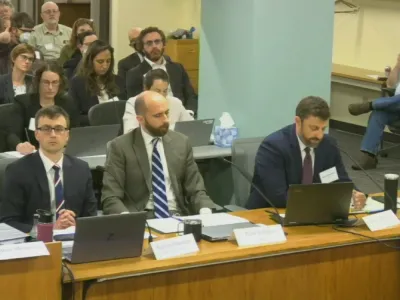CUB's testimony against the sale of Minnesota Power

Today, the Minnesota Public Utilities Commission is holding the first of two final hearings on the sale of Minnesota Power. You can watch the hearings live here.
Private equity firms seek to purchase the Minnesota utility at a premium of, at least, several hundred million dollars. They are paying this premium in order to gain control of the company, and intend to use that control to recoup their purchase price--plus a healthy return--from Minnesota ratepayers, before reselling the utility.
CUB's Senior Regulatory Advocate Brian Edstrom testified before the Commission this morning against the sale. Read his testimony below.
Private Purchase of Minnesota Power
CUB's Testimony
Good morning Chair Sieben and Commissioners. My name is Brian Edstrom, and I am here representing the Citizens Utility Board of Minnesota. Also with me from CUB is Annie Levenson Falk. And, though not online right now, our expert witness, Douglas Jester, is also available to join the hearing virtually if the Commission would like to ask him questions. I also want to join others in thanking Commission staff for the excellent briefing papers.
CUB believes the Commission should deny the acquisition.
As Staff articulated in Briefing Papers, a key question in this case is not whether ALLETE needs to access large amounts of capital; but rather whether the acquisition improves that access. In that regard, something that has bothered me throughout this proceeding is the inconsistent messaging the petitioners use, depending on the audience, when talking about how the acquisition will improve its access to capital.
When discussing it publicly, the Company suggests the acquisition offers “guaranteed access to capital to fund the clean energy transition.” But its important for the public to know—and for the Commission to recognize—that the acquisition provides no such guarantee. After purchasing ALLETE, the Partners are under no legally binding obligation to provide any capital to ALLETE, let alone fund ALLETE’s capital needs to achieve the clean energy transition through 2040. As discussed in more detail in our filings, the enforceability of even the near-term “commitment” to fund the Company’s five year capital plan is tenuous, at best.
Of particular interest to me, as a former securities attorney and securities regulator, is the inconsistency between how ALLETE describes its access to capital in its annual reports, or SEC Form 10-K, vs. the filings in this docket. In both places, ALLETE points to projected capital needs over the next five years. In this docket, ALLETE’s witnesses claim that ALLETE is unable to meet those projected needs without the acquisition. However, in the Company’s last two annual reports, the Company tells its shareholders it is “well positioned to meet [its] financing needs due to adequate operating cash flows, available additional working capital and access to capital markets.” This statement is made directly below the table outlining ALLETE’s 5 year capital projections and refers, specifically, to those projections—the very same table and projections ALLETE cites in this proceeding when claiming the acquisition is needed.
In briefs, the petitioners try to dismiss this language as a just a “single statement in a Form 10-K [that] has been superseded by the Company’s further analysis.” But this isn’t just any statement. It is a statement in a formal document public companies are legally required to produce, that was prepared with the assistance of sophisticated legal counsel, and that was signed by ALLETE’s CEO, CFO, and every member of its Board of Directors. The very purpose of the document is to provide information investors and shareholders rely on as truthful to make informed investment decisions, and there are serious legal consequences for knowingly making—or failing to correct-- materially false or misleading statements ALLETE cannot both truthfully tell its shareholders in that context it has adequate access to capital from the public markets and tell the Commission in this context it does not.
I have emphasized this point because this “single statement’ in the Form 10-K exemplifies what this whole case is all about. If ALLETE projects it is able to raise the capital it needs from public markets, then giving up access to those markets—and all the investors that participate in them—to instead rely entirely on two Partners who, as the ALJ put it, “have carefully committed to do very little” is hardly a benefit. Meanwhile, the risks opposing parties, their experts, and the ALJ have described in their filings clearly outweigh whatever remaining residual benefits arise from the settlement stipulation, including the amendment thereto filed yesterday.
Rather than showing the acquisition is consistent with the public interest, the record shows that the primary beneficiaries of this transaction are ALLETE’s current shareholders—who stand to receive a 19% to 22% premium on their shares— and, the Partners, who are willing to pay that premium to obtain control of ALLETE and the state-granted monopoly it operates in Minnesota Power. There is only one logical reason for the Partner’s paying such a hefty acquisition premium: they expect to earn a return higher than they would otherwise expect investing in ALLETE via the public markets. That return would be paid, in large part, by Minnesota Power’s captive customers.
Finally, while we appreciate the Commissioners' efforts to protect the public interest through their proposed decision options, we do not believe they resolve the fundamental question that should guide the Commission’s decision: whether the Petitioners have met their burden to prove the purported benefits of the acquisition outweigh its potential harms. The Petitioners have not met that burden. Therefore, we continue to recommend that the Acquisition be denied.
I am available for questions. Thank you.